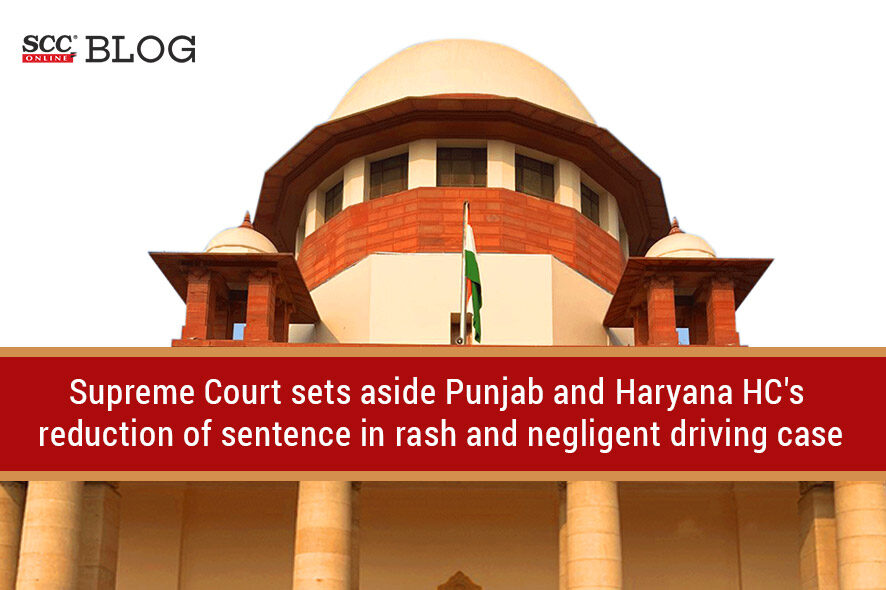Supreme Court: In a criminal appeal preferred by State of Punjab against the judgment and order by passed by Punjab and Haryana High Court upholding the respondent's conviction for offence under Section 304-A of Penal Code, 1860 (‘IPC') while reducing the sentence from 2 years to 8 months after deposit of compensation to the deceased's family, the Division Bench of M.R. Shah* and C.T. Ravikumar, JJ. quashed and set aside the impugned judgment and order while finding the High Court's undue sympathy unsustainable.
The facts state that the original accused was driving a car rashly and negligently while overtaking the ambulance from left side and the ambulance turned turtle due to collision. Because of this, one person died and two persons sitting in the ambulance also suffered injuries. The original accused was tried for offences under Sections 279 and 304-A of the IPC and his sentence was confirmed by the Sessions Court. Accused came up with a revision application before the High Court wherein, the Court confirmed the conviction under Section 304-A of IPC but reduced the sentence as mentioned above, considering the sentence period of 7.5 months already undergone by the accused and the present appeal challenges the said order of the High Court.
The Court observed that the High Court interfered with the sentence imposed by Trial Court by reducing the sentence without considering the manner and gravity of the offence committed due to which, the ambulance turned turtle, an innocent person lost his life and two persons sustained injuries, indicating towards the impact of rash and negligent driving. It further added that the High Court's order reflects that the accused coming from a poor family is a mitigating circumstance for the instant case. The Court said that the High Court did not properly consider the instant case of rash and negligent driving, and that the principle aim and object of IPC is to punish offenders. The Court further clarified that “Sections 279 and 304A can be invoked only if act of the accused is negligent and rash.”
The Court referred to the case of State of Arunachal Pradesh v. Ramchandra Rabidas, (2019) 10 SCC 75 wherein, the Court's emphasis on the need to strictly punish offenders responsible for causing motor vehicle accidents was observed in the following words: “With rapidly increasing motorisation, India is facing an increasing burden of road traffic injuries and fatalities. The financial loss, emotional and social trauma caused to a family on losing a bread winner, or any other member of the family, or incapacitation of the victim cannot be quantified. As observed and held, the principle of proportionality between crime and punishment has to be borne in mind. As observed that the principle of just punishment is the bedrock of sentencing in respect of a criminal offence.”
The Court referred to State of Punjab v. Saurabh Bakshi, (2015) 5 SCC 182 wherein, the High Court reduced the sentence for payment of compensation and the Supreme Court observed the same in realm of misplaced sympathy. It also relied on State of M.P. v. Surendra Singh, (2015) 1 SCC 222 based on similar facts of the case and found the High Court's undue sympathy unsustainable.
The Court quashed and set aside the impugned judgment and order passed by the High Court while reducing the sentence maintaining conviction for offence under Section 304-A of IPC in the instant case. The Court directed the authorities to take the accused into custody for undergoing the remaining sentence.
[State of Punjab v. Dil Bahadur, 2023 SCC OnLine SC 348, judgment dated 28-3-2023]
Judgment authored by: Justice M.R. Shah
Advocates who appeared in this case :
For Appellants: Advocate on Record Karan Sharma, AOR
For Respondents: Advocate on Record Aftab Ali Khan, Advocate Ali Safeer Farooqi, Advocate M.Z. Chaudhary, Advocate Nitin Kashyap, Advocate Syed Imtiyaz Ali








Indian roads are not broad enough , day by day vehicle numbers are increasing moreover slow speed vehicle and high speed vehicle travel in same road infact the driver finds very difficult to drive ,accidents will happen and which men cannot predict ,there are insurance companies and the parties are willing to settle the deceased hence it is inappropriate to give punishment for a driver unless he drives reckless.otherwise don’t ask to insure vehicles. Court is for compassion .Honourable judge may reconsider this case.